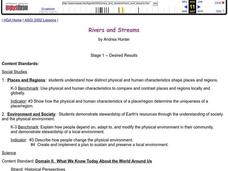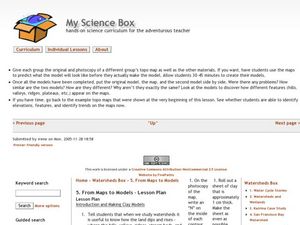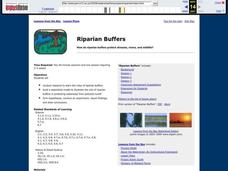Curated OER
Rivers and Streams
In this rivers and streams worksheet, students explore how rivers and streams react with the environment. Students also study where the major rivers flow in their local areas. Activities are provided that help students visualize the...
Curated OER
Rivers and Streams Research Activity
In this geography research worksheet, student examine books, newspapers, or the internet to find information about the history of flooding in the United Kingdom. They write a fictional account in a news report, TV interview, or a blog....
Curated OER
Topographic Connections: Earth's Surface Shapes Streams; Streams Sculpt the Earth
Students identify physical characteristics of developing streams and infer changes in the landscape by creating a river model.
Curated OER
Rivers & Watersheds
An outstanding presentation of rivers and watersheds awaits your earth scientists! The erosion process created by rivers is addressed. Viewers are introduced to v-shaped valleys, alluvial fans, and watersheds. Several slides are...
Curated OER
Gallery Walk Questions on Rivers
A Gallery Walk is a technique that allows small groups to visit different stations, where they examine and discuss materials about an overarching topic. Questions about rivers and fluvial processes are available in this resource;...
Curated OER
Rivers and Streams
Young scholars research the rivers, streams and water bodies of Hawaii. They read a variety of books, play Bingo with water-related terms, create and maintain water-themed journals, view videos, conduct Internet research and participate...
Curated OER
Stream Table
Students explore channelization, riparian habitats and soil erosion to find out about the aquatic habitats in Iowa. In this aquatic habitats lesson, students define important terms and read an article about pollution. ...
Curated OER
Is the Hudson River Too Salty to Drink?
In this estuary worksheet, students examine data about the salinity of the Hudson River, create a graph from given data and complete 12 short answer questions about the data and graph.
Curated OER
Geography Action! Rivers 2001- Stream Table
Students use a stream table to simulate river and watershed systems. The affect of gradient on stream flow as well as erosion and deposition are two items that students examine.
Curated OER
Overflowing the Banks
Students discover how levees hold a river within its banks and cause height of river to rise & back up into less well-protected tributaries that feed into the river, by constructing model of riverbanks, creating a flood, &...
Curated OER
From Maps to Models
Students explore watersheds through the use of a topographic map. They observe topographical maps and discuss their characteristics. In groups, students create a model clay island and make a topographical map of it. Afterward, groups...
Curated OER
Growth of a River
Students evaluate geography by drawing an image in class. In this river lesson, students identify a list of vocabulary terms associated with bodies of water. Students identify how a river is formed and draw a picture of one including the...
Curated OER
A River Runs Through It
Young scholars solve an environmental problem on a local river. They use their knowledge of river ecology to develop an action plan. They use river-monitoring equipment to collect river- monitoring data, including biological, physical,...
Curated OER
Dynamic River Model
Students develop the concepts of flood stage, levees, floodplain, and the dynamics of river flooding. They construct river models and test various flow rates and volumes. This lesson has an excellent experiment for students to do.
Curated OER
Questions About Rivers
Students investigate rivers. In this geography lesson, students work in cooperative groups to read about rivers from articles they have collected. Students form questions using Bloom's Taxonomy as a guide.
Curated OER
Tall as a Mountain, Flat as a Plain
Students examine a variety of landforms that are found on the Earth and compare and contrast the distinguishing qualities of these forms. A topographical model of the landforms is made.
Curated OER
Water Creates a Cave
Students study the role of water in limestone cave formation and create a cave on karst-like grid on paper.
US Environmental Protection Agency
Non-Point Source Pollution
Investigate the different types of pollution that storm drain runoff carries into oceans, lakes, rivers, and streams with this class demonstration. Using an aquarium and an assortment of everyday items that contaminants like motor oil,...
Curated OER
Riparian Buffers
Learners research the roles of riparian buffers and create a model that shows the role of the buffers in protecting waterways from pollution. They conduct an experiment from which they record their data in this unit which is spread over...
Curated OER
Know Your Watershed
Pupils investigate the importance and the location of their own watershed by visiting and EPA website and also work in groups to create an action plan on how to protect their local watershed.
Curated OER
Science: Draining the Land - the Mississippi River
Students use topographic maps to identify parts of rivers. In addition, they discover gradient and predict changes in the channels caused by variations in water flow. Other activities include sketching a river model with a new channel...
Curated OER
Be a Watershed - Create a Living River
Students investigate water ways by conducting an experiment with classmates. In this natural resources instructional activity, students define a watershed and identify where large ones are located within the United States. ...
Curated OER
A "Sedimental" Journey-Sediment Collection
Middle schoolers are asked how they would gather a sample of sediment from a lake, stream, river, pond, or swamp. They discuss safety concerns involving sample collections. Students are instructed to stay out of the water and to be...
Curated OER
Shedding Light on Watersheds
Students discuss what a watershed is, complete online activities showing them how to take care of a watershed, and create a model of a watershed that they experiment with to see what happens when it is disrupted by civilization.

























